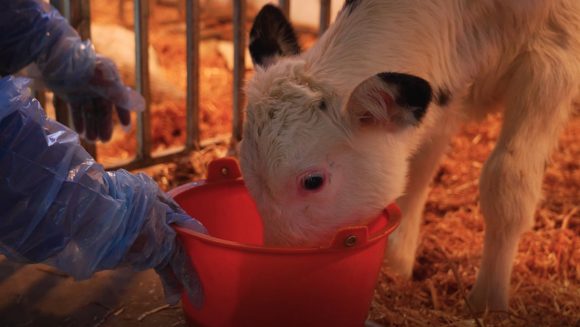The first cloned calf from a dairy "super cow".
Photo: Northwest A&F University
A team of scientists from China's Northwest University of Agricultural and Forestry Sciences and Technology has cloned three Holstein-Friesian dairy "super cows" for the first time.
The university announced Tuesday that the cloning was carried out by
somatic cell nuclear transfer
.
The birth weight of the first calf was 56.7 kilograms with a height of 113 centimeters.
Half an hour after birth, it began to ingest colostrum and clinical analyzes concluded that the calf was healthy, while its body shape and coat color were identical to those of
the cell
donor cow .
For cloning
, high-yield
, long-lived and stress-resistant cows from different farms in the country were chosen.
The annual milk production of these animals is more than 18 tons (about 18,556 liters) and more than 100 tons throughout their lives.
The scientists collected tissues from the donors, cultured them and proceeded to clone the embryos, which were later transferred into the uterus of recipient cows.
The birth weight of the first calf was 56.7 kilograms with a height of 113 centimeters.
The pregnancy rate in the recipients of the first batch of the
120 cloned embryos
reached 42%, while at 200 days of gestation it was 17.5%, which represents a great advance in the application of this technology for the reproduction of cows. high yield dairy.
"The application of somatic cell cloning technology
avoids the biosecurity risks of
introducing live cattle and greatly saves the high-quality germplasm resources that are about to be eliminated," said Jin Yaping, one of the authors of the paper. scientific work.
In addition, this technique will help to renew, preserve and expand the domestic fine-bred super-breeding cow herd, as well as the population of stud bulls "with independent intellectual property rights," he added.
China's dairy industry is 70% dependent on cattle imports
and has a total population of about 6.6 million Holstein cows.
However, on average only five out of 10,000 of these animals are highly productive, long-lived and stress resistant.
For this reason
, it is intended to establish within 2 to 3 years a herd made up of more than 1,000 dairy supercows
through cloning technology, oocyte collection, 'in vitro' embryo production and regulation of the estrous cycle of cattle, which in recent times they have been perfected by researchers from that university.
(With information from RT in Spanish)
